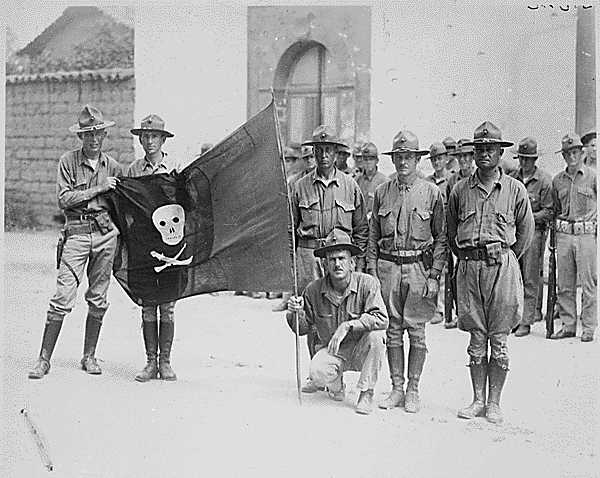Small Wars and Big Thoughts
[by Mark Safranski / “zen“]

U.S. Marines display captured flag of Nicaraguan rebels led by Augusto Cesar Sandino
While pop-centric COIN may be dead, small wars and irregular warfare will always be with us. We might say they are in the fourth or fifth generation; are an open-source insurgency; or have become “hybrid“; or exist in some kind of mysterious “gray zone“. Whatever we call them, small wars are here to stay.
Two recent publications explore the topic.
The first is a taxonomic work from Robert Bunker at the Strategic Studies Institute:
….Blood Cultist (Emergent). Strategic implications: Limited to moderate. This insurgency form can be viewed as a mutation of either radical Islam and/or rampant criminality, as found in parts of Latin America and Africa, into dark spirituality based on cult-like behaviors and activities involving rituals and even human sacrifice. To respond to this insurgency form, either federal law enforcement or the military will be the designated lead depending on the specific international incident taking place. An all-of-government approach will be required to mitigate and defeat this insurgency form, which has terrorism (and narco-terrorism) elements that represent direct threats—especially concerning the Islamic State—to the U.S. homeland […]
I strongly agree with Bunker’s “dark spirituality” angle present in deviant religious-military movements. For example, ISIS, for all its protestations of ultra-orthodoxy in its Salafism exudes a spirit of protean paganism in its words and deeds.
The second is a book, Clausewitz on Small War by Christopher Daase and James W. Davis (Hat tip to Nick Prime). From a book review at the London School of Economics:
….The current generation’s trend in understanding Clausewitz is that of moving beyond On War – an analysis which Clausewitz himself considered incomplete and which was published posthumously. As part of this shift, 2015 alone saw the publication of a new account of his life, together with a biography of his wife and a comparison between Napoleon’s and Clausewitz’s ideas on war, to name a few.
Through Clausewitz on Small War, Christopher Daase and James W. Davis make a significant contribution to such efforts of contextualisation. Yet theirs is quite distinct from other works, in that they translate into English writings that were thus far accessible only to those with a reading knowledge of German. This is precisely where the value of the book lies, as well as being the editors’ primary aim: opening up Clausewitz through translating his own words, rather than in interpreting them. In doing so, they offer the tools through which future analyses can be better informed.
The editors nonetheless do set out a case in the introduction: Clausewitz’s writings on ‘Small War’ are testimony to his continuing relevance. To illustrate this, they offer four chronologically arranged texts – a journey of how his thinking on Small War evolved. Each text was written with a different frame of mind. The first is comprised of lecture notes on small-unit warfare that are informal and rather technical; the second and third are memoranda distributed to military reformers and through which Clausewitz passionately makes the case for militias; and the final is a chapter from On War, again on the arming of the people.
I would add that ZP contributor, Lynn Rees, also had a recent post on the role of Marie von Clausewitz in shaping “Clausewitz” and Clausewitzian thought.
That’s it.



March 21st, 2016 at 11:14 am
I attended the Clausewitz Conference at Oxford in 2005. Heard Prof Daase first present his paper on Clausewitz and Kleinkrieg there. The paper is here:
.
http://www.clausewitz.com/readings/Daase/SmallWarsPaper.htm
.
A note on the contents of the book. Publishing the full notes of Clausewitz’s course on Kleinkrieg in English is significant. I would mention that Clausewitz was teaching Prussian officers during a time when Berlin was under French domination, so he had to be careful how he presented the material. French spies were a reality. Commenting on an ongoing war (in Spain) in which the French were doing badly had to be handed carefully as not to arouse attention. Had this domestic political situation been different, more “Prussian” we can say, then the lecture notes would have reflected that . . . all very Clausewitzian actually.
.
Not all the other Clausewitz documents are appearing in English for the first time. I would refer to “Carl von Clausewitz, Historical and Political Writings” from 1992 which contains a portion of the Bekenntnissdenkschrift and the article on the Landwehr.
March 22nd, 2016 at 3:40 am
Much thanks for the fuller context Seydlitz89!